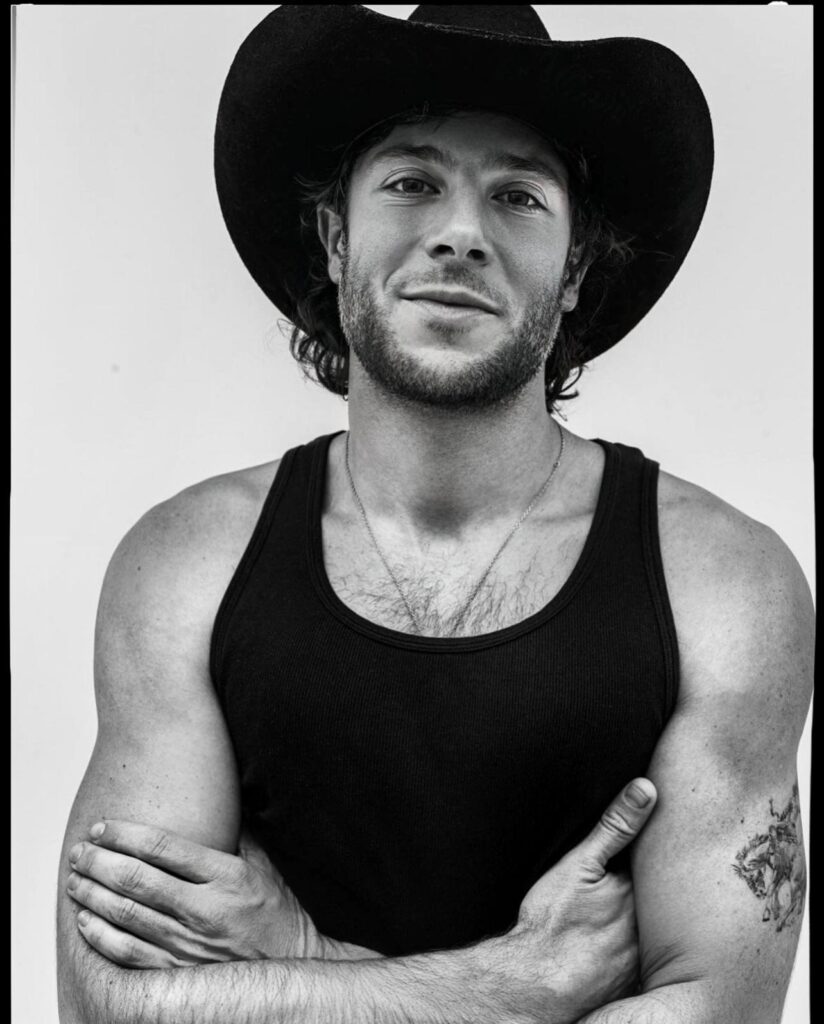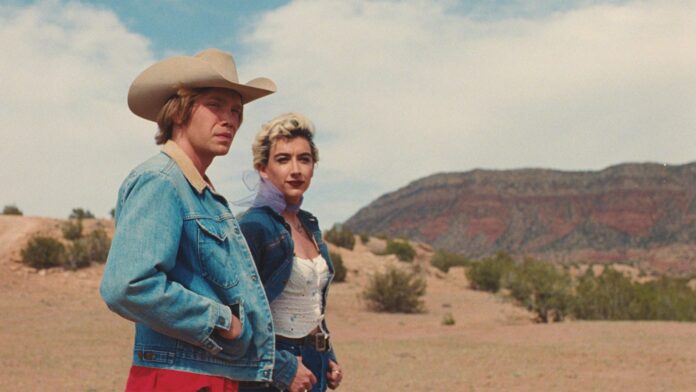Luke Gilford’s father was a rodeo rider and a member of the Professional Rodeo Cowboys Association. An early snapshot of the photographer and filmmaker, whose first feature, National Anthem, won the San Francisco Bay Area Film Critics Frameline Award at the recent film festival and opens at Bay Area theaters on Friday, is of the newborn Luke at rodeo in Cheyenne, Wyoming. The milieu made an impression on the child over the years.
“All my earliest memories are at rodeos,” Gilford says during a recent video call. “I was just so taken by the animals and the denim and hairspray and rhinestones and the sunsets and adrenaline and romance, all these things. It’s American mythology right out in the open air. And so, I love Western culture and I missed it. I really pushed it away as I was growing up, when I was a teenager.”
As a child, Gilford’s home base when his dad wasn’t on the rodeo circuit was Evergreen, Colorado. By the time he was a teenager, Gilford was living in San Ramon, where he graduated from California High School before heading south to study art at UCLA. Then in 2016, he discovered the International Gay Rodeo Association and his first love was reignited as he began photographing and talking to the performers, eventually creating a book, also called National Anthem.
He was about halfway through the photography project when he realized that though he might soon have enough pictures to complete what he’d started, he was not close to being done. He needed to go deeper and he realized that the story he wanted to tell really should be a film, so he started writing.
The story he and co-screenwriters David Largman Murray and Kevin Best arrived at centers around Dylan (Charlie Plummer, All the Money in the World), a 21-year-old day laborer, a young man forced into maturity beyond his years as he grapples with his chaotic mother Fiona (Robyn Lively) and provides stability to his tween brother Cassidy (Joey DeLeon).
At a job on a ranch run by Pepe (Rene Rosado), Dylan discovers a whole new world of queer cowpokes and rodeo folk and their freedom and flamboyance are a revelation to him. Dylan’s growing feelings for Pepe’s horsewoman girlfriend Sky (trans actress Eve Lindley) offers further inducement to hang around, as does the opportunity it affords him to open himself up to new friends and new experiences.
When it is suggested to Gilford that his movie, while a completely different beast, evokes John Huston’s 1962 drama The Misfits, he enthusiastically concurs with the idea. He even counts among his home décor framed behind-the-scenes photos from that film, in which Clark Gable, Montgomery Clift, Marilyn Monroe, and Eli Wallach form a sort of temporary family as the men prepare to capture wild mustangs in the Nevada desert.

When it came to making National Anthem, he found partial inspiration for one of the characters, the ranch’s nonbinary kind of housemother Carrie (Mason Alexander Park) in Monroe’s character, Roslyn, and he found a parallel between the films in the idea of a found family although he wanted to chart a different kind of connection.
“I was sort of bridging the gap between (the two types of families),” Gilford says. “The theme of the film is reconciling and coming to terms with the family you’re born into and bringing the two worlds together. I haven’t seen something like that and it felt so important and healing to put that into the world.”
National Anthem is also a homage to the International Gay Rodeo Association and its members. Gilford remembers how much he loved rodeos growing up but the world of mainstream rodeo is shot through with homophobia. It was a heartbreaking reality for Gilford until he discovered a rodeo he could embrace that embraced him back. Past the main cast, he packed the film with real rodeo riders and it was important that real rodeo appear on screen.
“Fortunately, we were able to film at real rodeos,” Gilford says. “It was important to me that they be authentic and not staged. It was such a gift to have that trust from the IGRA to be able to go in and safely do that. So many of the themes of the film are about community and family and we—our actors and crew—were to really become part of the family at the rodeo.
“It’s been almost 20 years since Brokeback Mountain and it just felt like it’s time for there to be more authentic representations of rural queerness,” he adds. “So, it was always important to me to include the real community in this film, and the real people who are out there living their lives this way.”
NATIONAL ANTHEM opens Fri/12 in Bay Area theaters.








